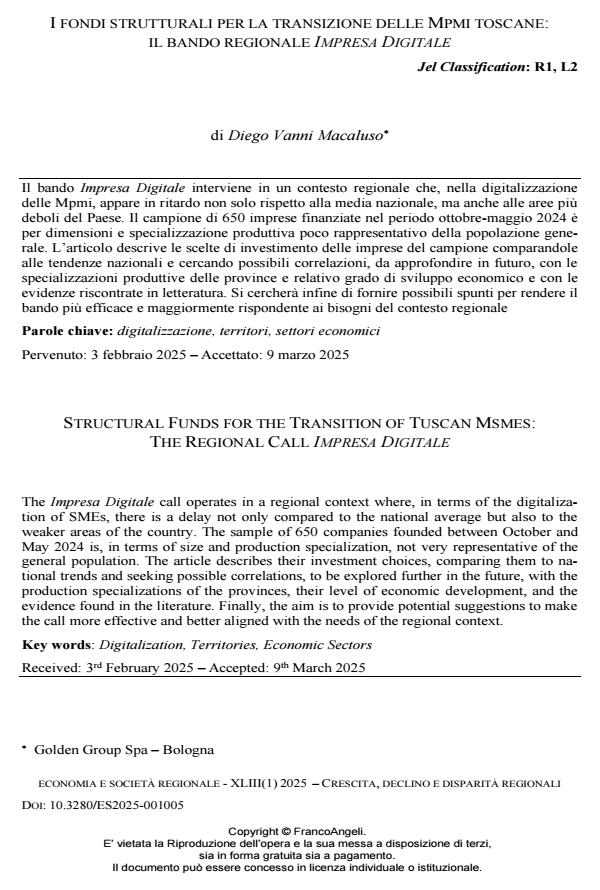I fondi strutturali per la transizione delle MPMI toscane: Il bando regionale impresa digitale
Titolo Rivista ECONOMIA E SOCIETÀ REGIONALE
Autori/Curatori Diego Vanni Macaluso
Anno di pubblicazione 2025 Fascicolo 2025/1
Lingua Italiano Numero pagine 14 P. 71-84 Dimensione file 281 KB
DOI 10.3280/ES2025-001005
Il DOI è il codice a barre della proprietà intellettuale: per saperne di più
clicca qui
Qui sotto puoi vedere in anteprima la prima pagina di questo articolo.
Se questo articolo ti interessa, lo puoi acquistare (e scaricare in formato pdf) seguendo le facili indicazioni per acquistare il download credit. Acquista Download Credits per scaricare questo Articolo in formato PDF

FrancoAngeli è membro della Publishers International Linking Association, Inc (PILA)associazione indipendente e non profit per facilitare (attraverso i servizi tecnologici implementati da CrossRef.org) l’accesso degli studiosi ai contenuti digitali nelle pubblicazioni professionali e scientifiche
Il bando Impresa Digitale interviene in un contesto regionale che, nella digitalizzazione delle Mpmi, appare in ritardo non solo rispetto alla media nazionale, ma anche alle aree più deboli del Paese. Il campione di 650 imprese finanziate nel periodo ottobre-maggio 2024 è per dimensioni e specializzazione produttiva poco rappresentativo della popolazione generale. L’articolo descrive le scelte di investimento delle imprese del campione comparandole alle tendenze nazionali e cercando possibili correlazioni, da approfondire in futuro, con le specializzazioni produttive delle province e relativo grado di sviluppo economico e con le evidenze riscontrate in letteratura. Si cercherà infine di fornire possibili spunti per rendere il bando più efficace e maggiormente rispondente ai bisogni del contesto regionale
Parole chiave:digitalizzazione, territori, settori economici
Jel codes:R1, L2
Diego Vanni Macaluso, I fondi strutturali per la transizione delle MPMI toscane: Il bando regionale impresa digitale in "ECONOMIA E SOCIETÀ REGIONALE " 1/2025, pp 71-84, DOI: 10.3280/ES2025-001005